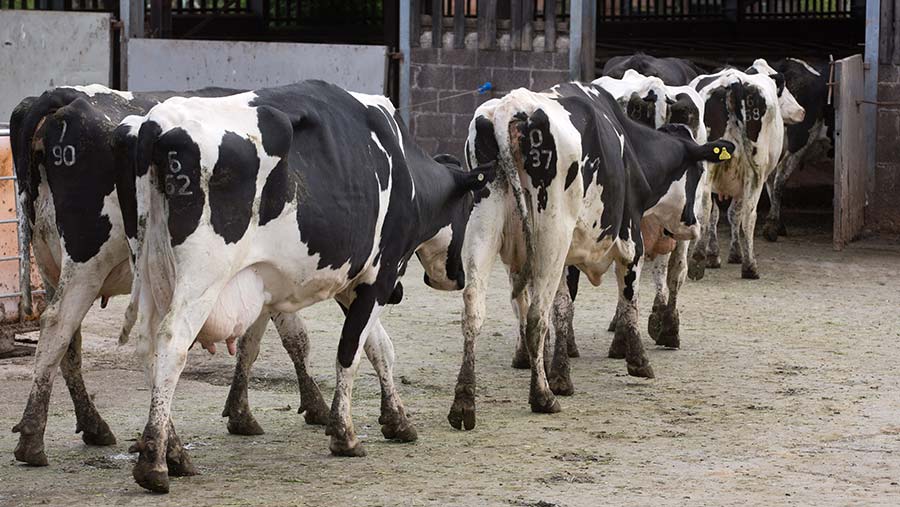Vet raises concerns over pressures of supermarket milk contracts
 © Tim Scrivener
© Tim Scrivener A vet has claimed supermarket pressure could force dairy farmers to use less-stringent cow mobility tests to meet milk contract specifications on lameness.
A number of retailers require their producer pool to conduct quarterly mobility assessments – either doing it themselves or through independent assessors.
But Cheshire vet Steven Crowe said a small proportion of Tesco-aligned producers in the region had complained independent mobility scoring run by his practice was too harsh.
The farmers feared losing their milk contracts if lameness figures were too high and were considering carrying out assessments themselves, alleged Mr Crowe of Nantwich Farm Vets.
The concern is this may not accurately reflect the true lameness prevalence on the farm.
See also: 5 tips for mobility scoring on dairy farms
“The aim [of the score] is to improve standards, but it’s having the opposite effect. They could force people to be more underhand in their scoring,” Mr Crowe said.
University of Nottingham lameness PhD student James Wilson said mobility scoring, providing it is done correctly, is a hugely valuable tool in helping improve lameness by detecting issues early.
He added: “At the end of the day, if it’s their livelihood on the line, what are you going to do? You can sympathise with farmers that have lameness. It’s a real challenge.
“The aligned contracts do need to change the rhetoric of ‘hit these targets or you are penalised’. There’s no real incentive to strive for good, only incentive to avoid bad.”
Mr Crowe suggested supermarkets should use more of a “carrot” approach to reward good practice rather than penalising farmers.
With aligned producers required to record a wealth of data, including medicine use, Mr Wilson said there was a risk that farmers performing poorly wouldn’t record other information accurately to safeguard their contracts.
Dr John Remnant from the University of Nottingham warned there was a real danger that if farmers measured mobility inaccurately, it would drive bad practice, and encouraged vets to write and voice their concerns to supermarkets.
Tesco has expressed its concern at the revelation and responded positively, assuring farmers they wouldn’t be delisted based on cow mobility alone.
Tesco said they advocated transparency in their supply chains and would welcome anyone to contact them with concerns.
It also said it audited each Tesco Sustainable Dairy Group farm annually, and as part of this, it assessed the accuracy of lameness scoring to validate data.
A Tesco spokesperson said: “We work closely with our farmers to drive improvement in animal health and welfare. On lameness, we hold workshops on mobility and foot-trimming in conjunction with the TDCE [Tesco Dairy Centre of Excellence] with the University of Liverpool Vet School, and have done so for several years.
“Lameness scoring makes up a very small part of our assessment of individual farms, so the risk of being removed from the Tesco milk pool because of poor mobility alone is low. Should any farms receive a poor assessment, we encourage and support them in the implementation of improvement plans.”
